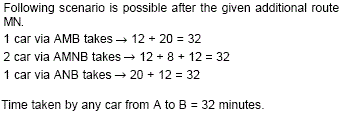CLAT 2017 Question Paper With Answers & Explanation
LRDI
Healthy Bites wishes to serve the orders as early as possible. The individual items in any order are served as and when ready; however, the order is considered to be completely served only when all the items of that order are served.
The table below gives the orders of three clients and the times at which they placed ttiear orders:

Q. 1 Assume that only one client's order can be processed at any given point of time. So, Anish or Bani
cannot start preparing a new order while a previous order is being prepared.
At what time is the order placed by Client 1 completely served?
Correct Answer
2
Explanation
Items ordered by client 1 at 10:00 are 1 burger,
3 portion of flies and 1 ice cream, out of which
preparation time of burger is maximum. So, while one
of the employees is preparing burger starting at 10:00,
the other one can start preparing ice-cream which
will take only 2 minutes and also the fries will get
prepared in the meantime in fryer.
Hence maximum time required to completely serve client
1’s order is 10 minutes.
Therefore, the order placed by client 1 can be served
completely at 10:10.
Q. 2 Assume that only one client's order can be processed at any given point of time. So, Anish or Bani
cannot start preparing a new order while a previous order is being prepared.
At what time is the order placed by Client 3 completely served?
Correct Answer
3
Explanation
Following the same process as we have done in above
question, client 1 will be served completely at 10:10.
After that, both the employers will start working on
client 2’s order and get it prepared by 10:15 as the
fries will take 5 minutes in the fryer and they can’t
work for two different clients at the same time. Hence,
preparation of client 3’s order will get started at 10:15
and as he/she has ordered for 1 burger along with
fries it will take 10 minutes for preparation.
Therefore, client 3 will be served completely at 10:25.
Q. 3 Suppose the employees are allowed to process multiple orders at a time, but the preference would
be to finish orders of clients who placed their orders earlier.
At what time is the order placed by Client 2 completely served?
Correct Answer
1
Explanation
Since the employees are allowed to process multiple
orders, the one who is preparing ice-cream for order
placed by client 1, will be free before 10:05, the time at
which client 2 placed his order.
Now as per his order, preparation of fries will take
more time than that of ice-cream. So, time taken by
fryer of 5 minutes for fries and simultaneously
2 minutes by an employee for ice-cream. Order of
client 2 will be served completely at 10:10.
Q. 4 Suppose the employees are allowed to process multiple orders at a time, but the preference would
be to finish orders of clients who placed their orders earlier.
Also assume that the fourth client came in only at 10:35. Between 10:00 and 10:30, for how many
minutes is exactly one of the employees idle?
Correct Answer
2
Explanation
Since the employees are allowed to process multiple
orders at a time, the following table shows the idle
time for employees before client 4 ordered at 10:35.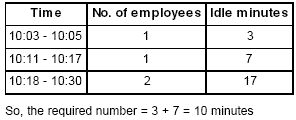
The kids surveyed were further divided into two groups based on whether their mothers dropped out of school before completing primary education or not. The table below gives the number of kids in different types of schools for mothers who dropped out of school before completing primary education;

It is also known that;
1. In S, 60% of the surveyed kids were in G. Moreover in S, all surveyed kids whose mothers had completed primary education were in school.
2. In NE, among the O kids, 50% had mothers who had dropped out before completing primary education.
3. The number of kids in G in NE was the same as the number of kids in G in W.
Q. 5 What percentage of kids from S were studying in P?
Correct Answer
1
Explanation
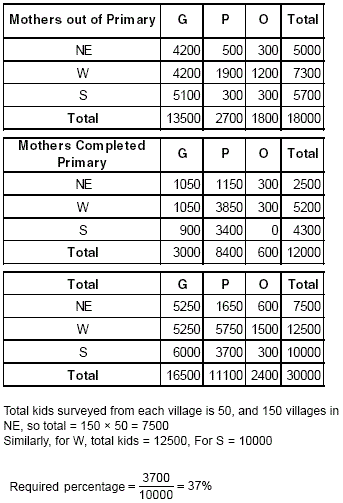
Q. 6 Among the kids in W whose mothers had completed primary education, how many were not in school?
Correct Answer
1
Explanation
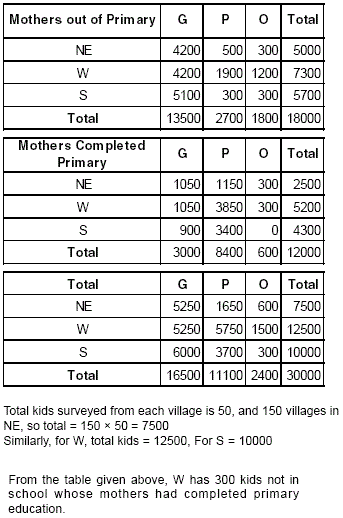
Q. 7 In a follow up survey of the same kids two years later, it was found that all the kids were now in
school. Of the kids who were not in school earlier, in one region, 25% were in G now, whereas the
rest were enrolled in P; in the second region, all such kids were in G now; while in the third region,
50% of such kids had now joined G while the rest had joined P. As a result, in all three regions put
together, 50% of the kids who were earlier out of school had joined G. It was also seen that no
surveyed kid had changed schools.
What number of the surveyed kids now were in G in W?
Correct Answer
1
Explanation
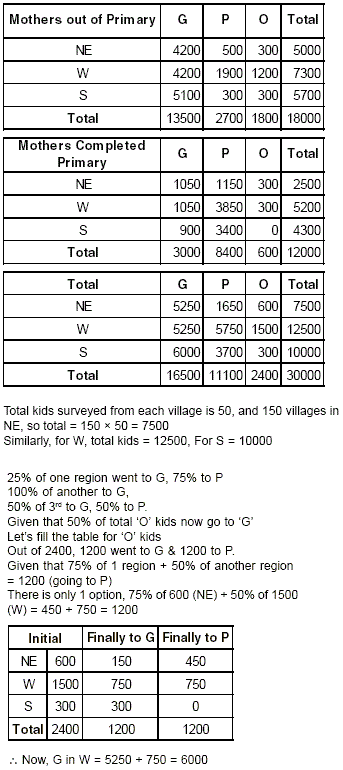
Q. 8 In a follow up survey of the same kids two years later, it was found that all the kids were now in
school. Of the kids who were not in school earlier, in one region, 25% were in G now, whereas the
rest were enrolled in P; in the second region, all such kids were in G now; while in the third region,
50% of such kids had now joined G while the rest had joined P. As a result, in all three regions put
together, 50% of the kids who were earlier out of school had joined G. It was also seen that no
surveyed kid had changed schools.
What percentage of the surveyed kids in S, whose mothers had dropped out before completing
primary education, were in G now?
Correct Answer
1
Explanation
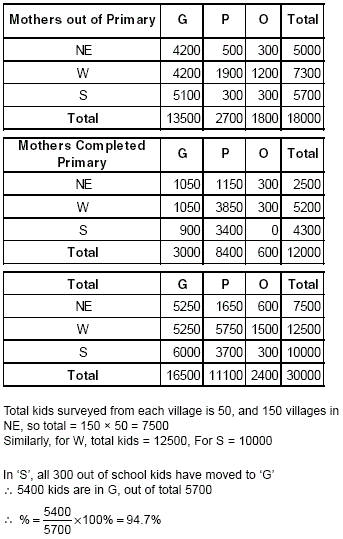
For the 200 candidates who are at or above the 90th percentile overall based on CET, the following are known about their performance in CET:
1. No one is below the 80th percentile in all 3 sections.
2. 150 are at or above the 80th percentile in exactly two sections.
3. The number of candidates at or above the 80th percentile only in P is the same as the number of candidates at or above the 80th percentile only in C. The same is the number of candidates at or above the 80th percentile only in M.
4. Number of candidates below 80th percentile in P: Number of candidates below 80th percentile in C: Number of candidates below 80th percentile in M = 4 : 2 : 1.
BIE uses a different process for selection. If any candidate is appearing in the AET by AIE, BIE considers their AET score for final selection provided the candidate is at or above the 80th percentile in P. Any other candidate at or above the 80th percentile in P in CET, but who is not eligible for the AET, is required to appear in a separate test to be conducted by BIE for being considered for final selection. Altogether, there are 400 candidates this year who are at or above the 80th percentile in P.
Q. 9 What best can be concluded about the number of candidates sitting for the separate test for BIE who were at or above the 90th percentile overall in GET?
Correct Answer
1
Explanation

Q. 10 If the number of candidates who are at or above the 90th percentile overall and also at or above the 80th percentile in all three sections in GET is actually a multiple of 5, what is the number of candidates who are at or above the 90th percentile overall and at or above the 80th percentile in both P and M in GET?
Correct Answer
60
Explanation

Q. 11 If the number of candidates who are at or above the 90th percentile overall and also at or above the 80th percentile in all three sections in GET is actually a multiple of 5, then how many candidates were shortlisted for the AET for AIE?
Correct Answer
170
Explanation

Q. 12 If the number of candidates who are at or above the 90th percentile overall and also are at or above the 80th percentile in P in CET, is more than 100, how many candidates had to sit for the separate test for BIE?
Correct Answer
1
Explanation

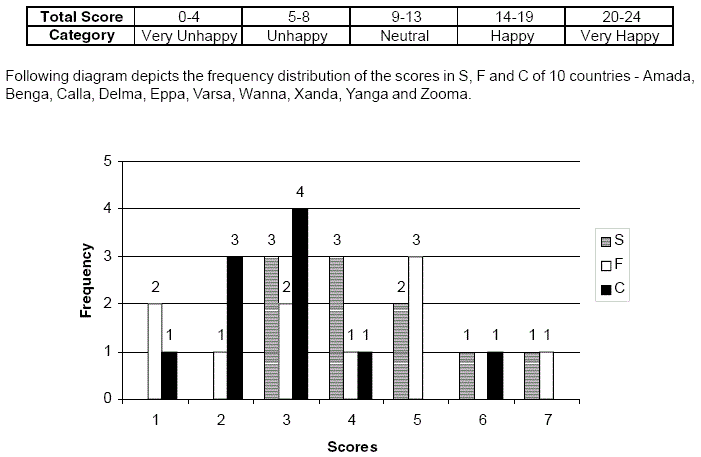
Further, the following arc known:
1. Amda and Calla jointly have the lowest total score, 7, with identical scores in all the three parameters.
2. Zooma has a total score of 17.
3. All the 3 countries, which are categorised as happy, have the highest score in exactly one parameter.
Q. 13 What is Amda’s score in F?
Correct Answer
1
Explanation
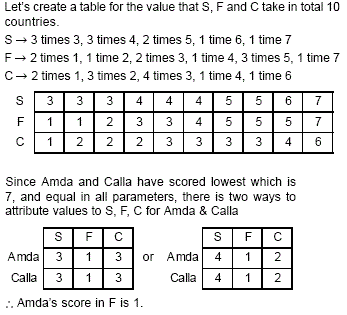
Q. 14 What is Zooma's score in S?
Correct Answer
6
Explanation
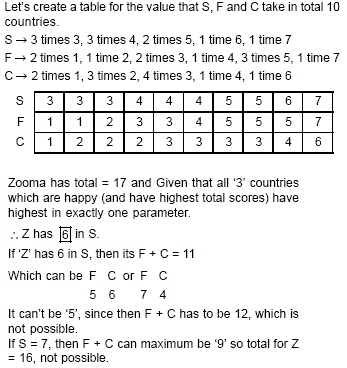
Q. 15 Benga and Delma, two countries categorised as happy, are tied with the same total score. What is the maximum score they can have?
Correct Answer
2
Explanation
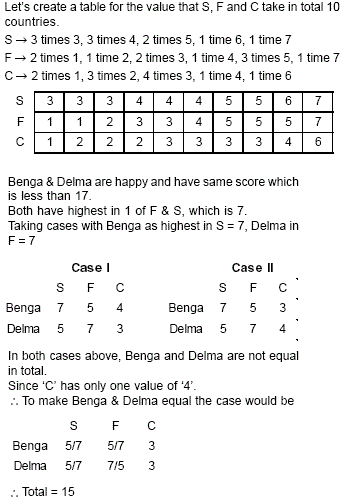
Q. 16 If Benga scores 16 and Delma scores 15, then what is the maximum number of countries with a score of 13?
Correct Answer
2
Explanation
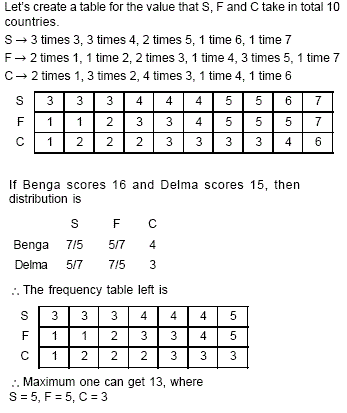
In the first month, T1 has one more SE than T2, T2 has one more SE than T3, T3 has one more SE than T4, and T4 has one more SE than T5. Between two successive months, the composition of the teams changes as follows:
a. The team allotted the challenging project, gets two SE from the team which was allotted the challenging project in the previous month. In exchange, one RE is shifted from the former team to the latter team.
b. After the above exchange, if T1 has any SE and T5 has any RE, then one SE is shifted from T1 to T5, and one RE is shifted fromT5 to T1. Also, if T2 has any SE and T4 has any RE, then one SE is shifted fromT2 to T4, and one RE is shifted from T4 to T2.
Each standard project has a total of 100 credit points, while each challenging project has 200 credit points. The credit points are equally shared between the employees included in that team.
Q. 17 The number of times in which the composition of team T2 and the number of times in which composition of team T4 remained unchanged in two successive months are:
Correct Answer
2
Explanation
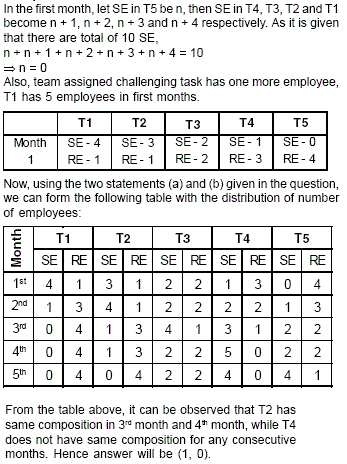
Q. 18 The number of SE in T1 and T5 for the projects in the third month are, respectively:
Correct Answer
1
Explanation
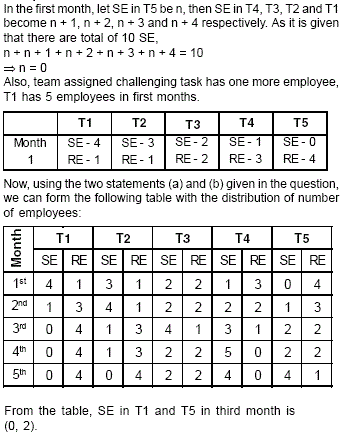
Q. 19 Which of the following CANNOT be the total credit points earned by any employee from the projects?
Correct Answer
2
Explanation
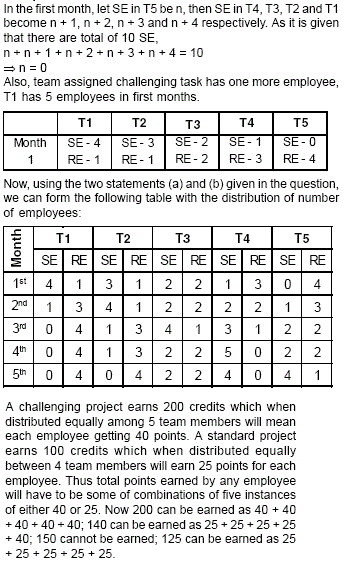
Q. 20 One of the employees named Aneek scored 185 points. Which of the following CANNOT be true?
Correct Answer
4
Explanation
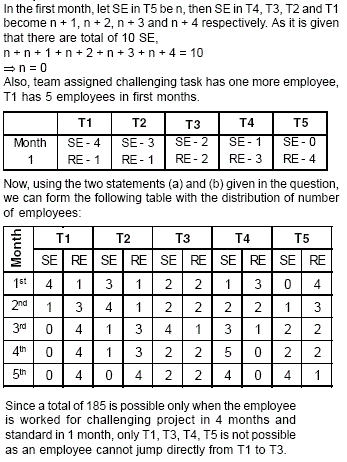

Individuals (all of same height) are seated on these platforms. We say an individual A can reach an individual B if all the three following conditions are met:
(i) A and B are in the same row or column
(ii) A is at a lower height than B
(iii) if there is/are any individual(s) between A and B, such individual(s) must be at a height lower than that of A.
Thus in the table given above, consider the individual seated at height 8 on 3rd row and 2nd column. He can be reached by four individuals. He can be reached by the individual on his left at height 7, by the two individuals on his right at heights of 4 and 6 and by the individual above at height 5.
Rows in the layout are numbered from top to bottom and columns are numbered from left to right.
Q. 21 How many individuals in this layout can be reached by just one individual?
Correct Answer
3
Explanation
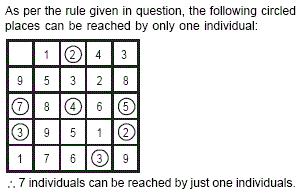
Q. 22 Which of the following is true for any individual at a platform of height 1 m in this layout?
Correct Answer
4
Explanation
Using (ii), ‘1’ being the smallest number in given layout no individual can reach to the individual at a platform of height 1.
Q. 23 We can find two individuals who cannot be reached by anyone in
Correct Answer
3
Explanation
In fourth column only, the individuals sitting at platforms of height 2 and 1 cannot be reached by any individual.
Q. 24 Which of the following statements is true about this layout?
Correct Answer
3
Explanation
(1) Row 1 doesn’t have any individual who can be
reached by 5 or more individual. Hence option (1) is
FALSE.
(2) Row 3 doesn’t have any individual who cannot
be reached by anyone. Hence option (2) is FALSE.
(4) 9 in Row 2 can not be reached by 5 or more
individual. Hence option (4) is also FALSE.
The underlying principle that they are working on is the following:
Any person staying in any of these 10 cities should be able to make a trip to any other city in the morning and should be able to return by the evening of the same day.
Q. 25 If the underlying principle is to be satisfied in such a way that the journey between any two cities can be performed using only direct (non-stop) flights, then the minimum number of direct flights to be scheduled is
Correct Answer
3
Explanation
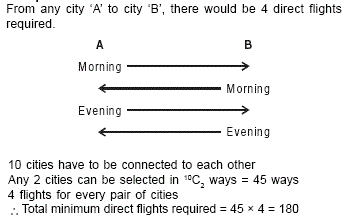
Q. 26 Suppose three of the ten cities are to be developed as hubs. A hub is a city which is connected with every other city by direct flights each way, both in the morning as well as in the evening. The only direct flights which will be scheduled are originating and/or terminating in one of the hubs. Then the minimum number of direct flights that need to be scheduled so that the underlying principle of the airline to serve all the ten cities is met without visiting more than one hub during one trip is:
Correct Answer
3
Explanation
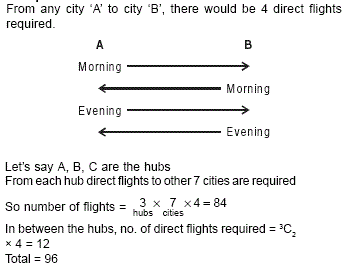
Q. 27 Suppose the 10 cities are divided into 4 distinct groups G1, G2, G3, G4 having 3, 3, 2 and 2 cities
respectively and that G1 consists of cities named A, B and C. Further, suppose that direct flights
are allowed only between two cities satisfying one of the following:
1. Both cities are in G1
2. Between A and any city in G2
3. Between B and any city in G3
4. Between C and any city in G4
Then the minimum number of direct flights that satisfies the underlying principle of the airline is:
Correct Answer
40
Explanation
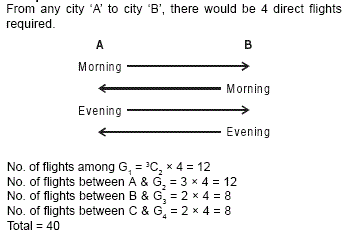
Q. 28 Suppose the 10 cities are divided into 4 distinct groups G1, G2, G3, G4 having 3, 3, 2 and 2 cities
respectively and that G1 consists of cities named A, B and C. Further, suppose that direct flights
are allowed only between two cities satisfying one of the following:
1. Both cities are in G1
2. Between A and any city in G2
3. Between B and any city in G3
4. Between C and any city in G4
However, due to operational difficulties at A, it was later decided that the only flights that would operate at A would be those to and from B. Cities in G2 would have to be assigned to G3 or to G4.
What would be the maximum reduction in the number of direct flights as compared to the situation before the operational difficulties arose?
Correct Answer
4
Explanation
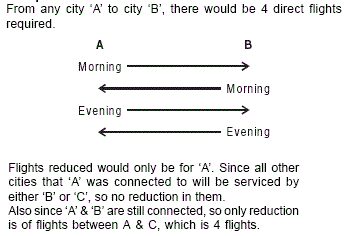
The police department orders each car to take a particular route in such a manner that it is not possible for any car to reduce its travel time by not following the order, while the other cars are following the order.
Q. 29 How many cars would loe asked to take the route A-N-B, that is Akala-Nanur-Bakala route, by the police department?
Correct Answer
2
Explanation
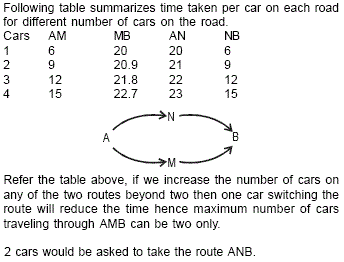
Q. 30 If all the cars follow the police order, what is the difference in travel time (in minutes) between a car which takes the route A-N-B and a car that takes the route A-M-B?
Correct Answer
2
Explanation
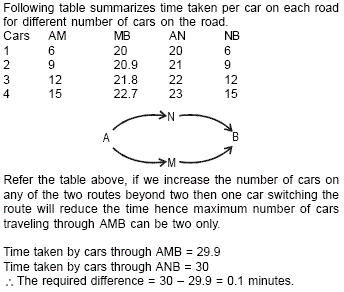
Q. 31 A new one-way road is built from M to N. Each car now has three possible routes to travel from A to
B: A-M-B, A-N-B and A-M-N-B. On the road from M to N, one car takes 7 minutes and each
additional car increases the travel time per car by 1 minute. Assume that any car taking the A-M-NB
route travels the A-M portion at the same time as other cars taking the A-M-B route, and the N-B
portion at the same time as other cars taking the A-N-B route.
How many cars would the police department order to take the A-M-N-B route so that it is not
possible for any car to reduce its travel time by not following the order while the other cars follow the
order? (Assume that the police department would never order all the cars to take the same route.)
Correct Answer
2
Explanation
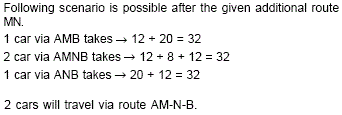
Q. 32 A new one-way road is built from M to N. Each car now has three possible routes to travel from A to
B: A-M-E, A-N-B and A-M-N-B. On the road from M to N, one car takes 7 minutes and each
additional car increases the travel time per car by 1 minute. Assume that any car taking the A-M-NB
route travels the A-M portion at the same time as other cars taking the A-M-B route, and the N-B
portion at the same time as other cars taking the A-N-B route.
If all the cars follow the police order, what is the minimum travel time (in minutes) from A to B?
(Assume that the police department would never order all the cars to take the same route.)
Correct Answer
2
Explanation
